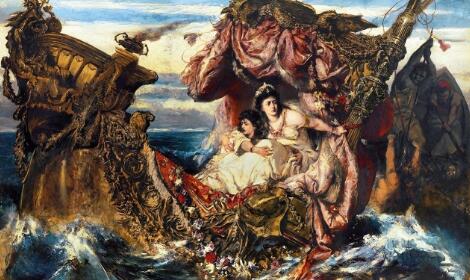历史版:罗马统治下的希腊人会把自己看成罗马人吗?(下)
正文翻译

I think for the northern and western European provinces (Hispania, Gaul, parts of Germania) they probably did, because they had less of a centralized cultural identity to begin with.
我觉得,北欧和西欧行省(西班牙行省,纳博讷高卢行省,大日耳曼尼亚行省的一部分)的人可能会,因为他们从一开始就没有多少整齐划一的文化身份认同。
I have a hard time believing though that Greeks, with all their history and culture would have ever identified as Roman over Greek. The same can be said for Egypt. I feel like they must have recognized that they were legally part of the Roman Empire, but only to the degree that for example Australia identifies as part of the British empire. Their identity would still rest entirely with their own country.
我很难相信拥有丰富历史和昌明文化的希腊人会把自己看成罗马人而不是希腊人。也可以认为埃及是同样的情况。我的感觉是他们肯定承认自己在法律上属于罗马帝国,但这种认同也就是澳大利亚对大英帝国的那种认同程度而已。他们的身份认同仍然完全系于自己的国家。
Any thoughts?
各位有什么看法?

I think for the northern and western European provinces (Hispania, Gaul, parts of Germania) they probably did, because they had less of a centralized cultural identity to begin with.
我觉得,北欧和西欧行省(西班牙行省,纳博讷高卢行省,大日耳曼尼亚行省的一部分)的人可能会,因为他们从一开始就没有多少整齐划一的文化身份认同。
I have a hard time believing though that Greeks, with all their history and culture would have ever identified as Roman over Greek. The same can be said for Egypt. I feel like they must have recognized that they were legally part of the Roman Empire, but only to the degree that for example Australia identifies as part of the British empire. Their identity would still rest entirely with their own country.
我很难相信拥有丰富历史和昌明文化的希腊人会把自己看成罗马人而不是希腊人。也可以认为埃及是同样的情况。我的感觉是他们肯定承认自己在法律上属于罗马帝国,但这种认同也就是澳大利亚对大英帝国的那种认同程度而已。他们的身份认同仍然完全系于自己的国家。
Any thoughts?
各位有什么看法?
评论翻译
seanclarke
To this day the Greek word for Greeks living abroad is Romioi, Romans
直到今天,都有一个希腊词可用来指称生活在国外的希腊人:Romioi,即罗马人。
Not just them.
(回)不只是他们。
Merely two days ago, the globally famous Greek leftish composer and lyricist, Mikis Theodorakis passed away, a very prominent and beloved figure in Greece, passed away. To honour him, the Greek Prime Minister, Kyriakos Mitsotakis made the following statement:
仅仅两天前,驰名全世界的希腊左派词曲作家米吉斯·西奥多拉基斯去世了,这位在希腊声名显赫且受人爱戴的人物去世了。为了纪念他,希腊总理基里亚科斯·米佐塔基斯发表了如下的声明:
«μας αφήνει παρακαταθήκη τα τραγούδια του, την πολιτική του δράση, αλλά και την εθνική του προσφορά σε κρίσιμες στιγμές. Η Ρωμιοσύνη σήμερα κλαίει».
"he is leaving us as a legacy his songs, his political activities and his national contribution in crucial moments. Rhomiosene laments today"
“他留给我们的遗产是他创作的歌曲、他的政治活动以及他在关键时刻对国家作出的贡献。今天是Rhomiosene的哀恸之日”
This Rhomiosene is nothing other than the Modern Romanitas, the political, cultural and even national collection of elements that compose the identity of the Romans. This comes from a direct and uniterrupted continuation from the Medi Period, the Rhomaikotita of the Medi Roman Greeks. For the Modern Greeks, Hellenesmos (the totality of Hellenic Culture, in other words Greekness) is a synonym and tautology of Rhomiosene, and they cannot be seen as separate concepts in any way possible.
这里的Rhomiosene不是别的,正是现代的古罗马精神,是构成罗马人身份认同的政治、文化甚至是民族元素的集合。这是一种源自中世纪时期的直接且不间断的延续,即中世纪罗马希腊人的Rhomaikotita。对现代希腊人来说,Hellenesmos(希腊文化的整体,换句话说就是希腊性)是Rhomiosene的代名词和同义反复,不管从什么角度看,它们都不能被视为独立的概念。
OMightyMartian
Long before the collapse of the Second Triumvirate and the final conquest of Egypt, Egypt had already been colonized by the Greeks. Egyptian culture was in a terminal decline, probably long before Alexander the Great showed up, but basically, the Ptolemies were Greeks who played dress up as Pharaohs, even though their political base were the huge numbers of Greeks living in cities like Alexandria. When Octavian wiped out the forces of Antony and Cleopatra, he wasn't defeating Egyptians, he was beating an Eastern Mediterranean Greco-Roman alliance.
在后三头同盟崩溃以及最终征服埃及之前很久,埃及就已经被希腊人殖民了。埃及文化可能早在亚历山大大帝出现以前就已经处于衰败的晚期了,但基本上,托勒密王朝是希腊人的,他们把自己装扮成了法老,尽管他们的政治根基是生活在亚历山大港等城市的海量希腊人。屋大维消灭安东尼和克利奥帕特拉(即埃及艳后)的部队时,他打败的并不是埃及人,而是地中海东部的希腊-罗马联盟。
But the Egyptian people themselves did retain a separate identity, all through the Roman and Byzantine periods, and one that even during the Byzantine era lead to considerable strife between Constantinople and Alexandria, and probably was largely responsible for the Islamic conquest of Egypt; due to the liturgical and Christological differences between Coptic and Greek Orthodox Christianity. Coptic certainly remained the largest spoken language in Egypt well into the Middle Ages, so obviously there was a very strong Egyptian identity; surviving Greek, Roman and Islamic conquests, though now, the Copts are small minority in Egypt.
但埃及人确实在整个罗马帝国和拜占庭帝国时期保住了独立的身份,这种身份认同,甚至在拜占庭时期导致君士坦丁堡和亚历山大港之间出现了相当大的冲突,而且很可能在很大程度上招致了伊斯兰教对埃及的征服,原因就在于科普特人和希腊东正教在礼拜仪式和基督论上的分歧。直到中世纪,科普特语仍然是埃及使用人数最多的语言,所以很明显,当时存在一种很强的埃及人身份认同,在希腊、罗马和伊斯兰的征服中幸存了下来,尽管今天的科普特人在埃及是少数族群。
(译注:科普特人是一世纪时皈依基督教的埃及人的后裔,占埃及总人口的15%-20%)
xclame
That doesn't really answer the question. People from from Puerto Rico are officially American citizens, but I'll bet most of them feel more like Puerto Ricanos then they do Americans.
I think that's what the person is asking. Did they consider themselves and behave like Romans or did they consider themselves and act like Greeks, who just happened to be "ruled" by Rome.
这并没有真正回答这个问题。来自波多黎各的人是正式的美国公民,但我敢打赌,他们中的大部分人感觉上更像波多黎各人,而不是美国人。
我想这就是楼主想要问的。他们是把自己看成罗马人而且行为也像罗马人,还是把自己看成希腊人而且也如希腊人那样行事,只是碰巧被罗马“统治”了。
CupOfHemlock
There were people in the Aegean islands who called themselves Romans until the 1900s the last holdouts of Roman Power.
直到1900年代,爱琴海上的一些岛民都还在自称罗马人,他们是罗马政权最后的坚守者。
The word Ρωμιός (Roman) as a way to identify a Greek speaking person from Greece and Asia Minor is still used until today. It was very popular antil the 70’s, now it has faded in favor of the ethnonym Έλληνας (Hellene).
(回)Ρωμιός(罗马人)一词是识别来自希腊和小亚细亚地区讲希腊语人的一种方法,此法直到今天还在使用。这个词直到七十年代都非常流行,现在已经逐渐退场了,转而使用民族语地名Έλληνας(Hellene,即希腊人)。
OMightyMartian
While Greek language ultimately retracted back into Greece itself, if you view Eastern Orthodoxy as an expression of Hellenic culture (Eastern Orthodox traditions and theology certainly are), I'd argue that the conversion of the Slavs and the view of the Slavic, and in particular the Russian church as the successor to Byzantium as a means by which aspects of Byzantine culture propagated eastward. And I agree that Latin culture in its way did persist, it also fragmented, and in the Germanic world (including England) was heavily intermixed with German culture in a similar way to the intermixing with Late Hellenic culture with Slavic culture. And for a good deal of time in eastern Europe they were in competition, as both Catholic and Orthodox missions raced to convert the Slavs, to the point that Eastern Orthodox bishops viewed Catholic incursions among people like the Poles as a kind of warfare, laying the groundwork for the east-west clashes we see over a thousand years later.
虽然希腊语最终退回了希腊本土,但如果你把东正教看成希腊文化的一种表现(东正教的传统和神学当然是了),我会主张斯拉夫人的皈依,以及将斯拉夫人特别是俄罗斯教会视为拜占庭的继承者,是拜占庭文化的各方各面向东传播的一种方式。我同意,拉丁文化确实以自己的方式留存了下来,而它也是支离破碎的,而且在日耳曼世界(包括英格兰)中与德国文化深度混杂,与晚期希腊文化同斯拉夫文化的混杂方式相似。在相当长的一段时间里,它们在东欧是处于竞争状态的,因为天主教和东正教的传教士都竞相让斯拉夫人皈依,竞争之激烈都到了这种程度,当时的东正教主教把天主教对波兰人等族群的入侵看成了战争行为,为我们在千年后见证的东西方冲突奠定了基础。
PiddlyD
Do Texans think of themselves as US citizens?
Not a perfect example of course - but I think there are some obvious parallels.
德州人会认为自己是美国公民吗?
当然了,这个例子并不完美,但我认为两者间存在明显的相似之处。
roffadude
Northern Europe definitely did not “feel like romans”.
北欧可绝对没有“感觉自己是罗马人”。
ApprehensivePiglet86
Well the Greeks called themselves "Romanioi" or "Romans" until the 1800s while being ruled by the Ottoman Empire, so if they didn't at first they readily accepted Romanisation and Roman identity.
Can't speak for Egypt though
希腊人虽然被奥斯曼帝国统治,但一直到十九世纪都称自己为“Romanioi”或 “罗马人”,所以就算他们一开始没有,但终究还是很乐意接受罗马化和罗马人的身份的。
但不能说埃及也是这种情况。
To this day the Greek word for Greeks living abroad is Romioi, Romans
直到今天,都有一个希腊词可用来指称生活在国外的希腊人:Romioi,即罗马人。
Not just them.
(回)不只是他们。
Merely two days ago, the globally famous Greek leftish composer and lyricist, Mikis Theodorakis passed away, a very prominent and beloved figure in Greece, passed away. To honour him, the Greek Prime Minister, Kyriakos Mitsotakis made the following statement:
仅仅两天前,驰名全世界的希腊左派词曲作家米吉斯·西奥多拉基斯去世了,这位在希腊声名显赫且受人爱戴的人物去世了。为了纪念他,希腊总理基里亚科斯·米佐塔基斯发表了如下的声明:
«μας αφήνει παρακαταθήκη τα τραγούδια του, την πολιτική του δράση, αλλά και την εθνική του προσφορά σε κρίσιμες στιγμές. Η Ρωμιοσύνη σήμερα κλαίει».
"he is leaving us as a legacy his songs, his political activities and his national contribution in crucial moments. Rhomiosene laments today"
“他留给我们的遗产是他创作的歌曲、他的政治活动以及他在关键时刻对国家作出的贡献。今天是Rhomiosene的哀恸之日”
This Rhomiosene is nothing other than the Modern Romanitas, the political, cultural and even national collection of elements that compose the identity of the Romans. This comes from a direct and uniterrupted continuation from the Medi Period, the Rhomaikotita of the Medi Roman Greeks. For the Modern Greeks, Hellenesmos (the totality of Hellenic Culture, in other words Greekness) is a synonym and tautology of Rhomiosene, and they cannot be seen as separate concepts in any way possible.
这里的Rhomiosene不是别的,正是现代的古罗马精神,是构成罗马人身份认同的政治、文化甚至是民族元素的集合。这是一种源自中世纪时期的直接且不间断的延续,即中世纪罗马希腊人的Rhomaikotita。对现代希腊人来说,Hellenesmos(希腊文化的整体,换句话说就是希腊性)是Rhomiosene的代名词和同义反复,不管从什么角度看,它们都不能被视为独立的概念。
OMightyMartian
Long before the collapse of the Second Triumvirate and the final conquest of Egypt, Egypt had already been colonized by the Greeks. Egyptian culture was in a terminal decline, probably long before Alexander the Great showed up, but basically, the Ptolemies were Greeks who played dress up as Pharaohs, even though their political base were the huge numbers of Greeks living in cities like Alexandria. When Octavian wiped out the forces of Antony and Cleopatra, he wasn't defeating Egyptians, he was beating an Eastern Mediterranean Greco-Roman alliance.
在后三头同盟崩溃以及最终征服埃及之前很久,埃及就已经被希腊人殖民了。埃及文化可能早在亚历山大大帝出现以前就已经处于衰败的晚期了,但基本上,托勒密王朝是希腊人的,他们把自己装扮成了法老,尽管他们的政治根基是生活在亚历山大港等城市的海量希腊人。屋大维消灭安东尼和克利奥帕特拉(即埃及艳后)的部队时,他打败的并不是埃及人,而是地中海东部的希腊-罗马联盟。
But the Egyptian people themselves did retain a separate identity, all through the Roman and Byzantine periods, and one that even during the Byzantine era lead to considerable strife between Constantinople and Alexandria, and probably was largely responsible for the Islamic conquest of Egypt; due to the liturgical and Christological differences between Coptic and Greek Orthodox Christianity. Coptic certainly remained the largest spoken language in Egypt well into the Middle Ages, so obviously there was a very strong Egyptian identity; surviving Greek, Roman and Islamic conquests, though now, the Copts are small minority in Egypt.
但埃及人确实在整个罗马帝国和拜占庭帝国时期保住了独立的身份,这种身份认同,甚至在拜占庭时期导致君士坦丁堡和亚历山大港之间出现了相当大的冲突,而且很可能在很大程度上招致了伊斯兰教对埃及的征服,原因就在于科普特人和希腊东正教在礼拜仪式和基督论上的分歧。直到中世纪,科普特语仍然是埃及使用人数最多的语言,所以很明显,当时存在一种很强的埃及人身份认同,在希腊、罗马和伊斯兰的征服中幸存了下来,尽管今天的科普特人在埃及是少数族群。
(译注:科普特人是一世纪时皈依基督教的埃及人的后裔,占埃及总人口的15%-20%)
xclame
That doesn't really answer the question. People from from Puerto Rico are officially American citizens, but I'll bet most of them feel more like Puerto Ricanos then they do Americans.
I think that's what the person is asking. Did they consider themselves and behave like Romans or did they consider themselves and act like Greeks, who just happened to be "ruled" by Rome.
这并没有真正回答这个问题。来自波多黎各的人是正式的美国公民,但我敢打赌,他们中的大部分人感觉上更像波多黎各人,而不是美国人。
我想这就是楼主想要问的。他们是把自己看成罗马人而且行为也像罗马人,还是把自己看成希腊人而且也如希腊人那样行事,只是碰巧被罗马“统治”了。
CupOfHemlock
There were people in the Aegean islands who called themselves Romans until the 1900s the last holdouts of Roman Power.
直到1900年代,爱琴海上的一些岛民都还在自称罗马人,他们是罗马政权最后的坚守者。
The word Ρωμιός (Roman) as a way to identify a Greek speaking person from Greece and Asia Minor is still used until today. It was very popular antil the 70’s, now it has faded in favor of the ethnonym Έλληνας (Hellene).
(回)Ρωμιός(罗马人)一词是识别来自希腊和小亚细亚地区讲希腊语人的一种方法,此法直到今天还在使用。这个词直到七十年代都非常流行,现在已经逐渐退场了,转而使用民族语地名Έλληνας(Hellene,即希腊人)。
OMightyMartian
While Greek language ultimately retracted back into Greece itself, if you view Eastern Orthodoxy as an expression of Hellenic culture (Eastern Orthodox traditions and theology certainly are), I'd argue that the conversion of the Slavs and the view of the Slavic, and in particular the Russian church as the successor to Byzantium as a means by which aspects of Byzantine culture propagated eastward. And I agree that Latin culture in its way did persist, it also fragmented, and in the Germanic world (including England) was heavily intermixed with German culture in a similar way to the intermixing with Late Hellenic culture with Slavic culture. And for a good deal of time in eastern Europe they were in competition, as both Catholic and Orthodox missions raced to convert the Slavs, to the point that Eastern Orthodox bishops viewed Catholic incursions among people like the Poles as a kind of warfare, laying the groundwork for the east-west clashes we see over a thousand years later.
虽然希腊语最终退回了希腊本土,但如果你把东正教看成希腊文化的一种表现(东正教的传统和神学当然是了),我会主张斯拉夫人的皈依,以及将斯拉夫人特别是俄罗斯教会视为拜占庭的继承者,是拜占庭文化的各方各面向东传播的一种方式。我同意,拉丁文化确实以自己的方式留存了下来,而它也是支离破碎的,而且在日耳曼世界(包括英格兰)中与德国文化深度混杂,与晚期希腊文化同斯拉夫文化的混杂方式相似。在相当长的一段时间里,它们在东欧是处于竞争状态的,因为天主教和东正教的传教士都竞相让斯拉夫人皈依,竞争之激烈都到了这种程度,当时的东正教主教把天主教对波兰人等族群的入侵看成了战争行为,为我们在千年后见证的东西方冲突奠定了基础。
PiddlyD
Do Texans think of themselves as US citizens?
Not a perfect example of course - but I think there are some obvious parallels.
德州人会认为自己是美国公民吗?
当然了,这个例子并不完美,但我认为两者间存在明显的相似之处。
roffadude
Northern Europe definitely did not “feel like romans”.
北欧可绝对没有“感觉自己是罗马人”。
ApprehensivePiglet86
Well the Greeks called themselves "Romanioi" or "Romans" until the 1800s while being ruled by the Ottoman Empire, so if they didn't at first they readily accepted Romanisation and Roman identity.
Can't speak for Egypt though
希腊人虽然被奥斯曼帝国统治,但一直到十九世纪都称自己为“Romanioi”或 “罗马人”,所以就算他们一开始没有,但终究还是很乐意接受罗马化和罗马人的身份的。
但不能说埃及也是这种情况。










